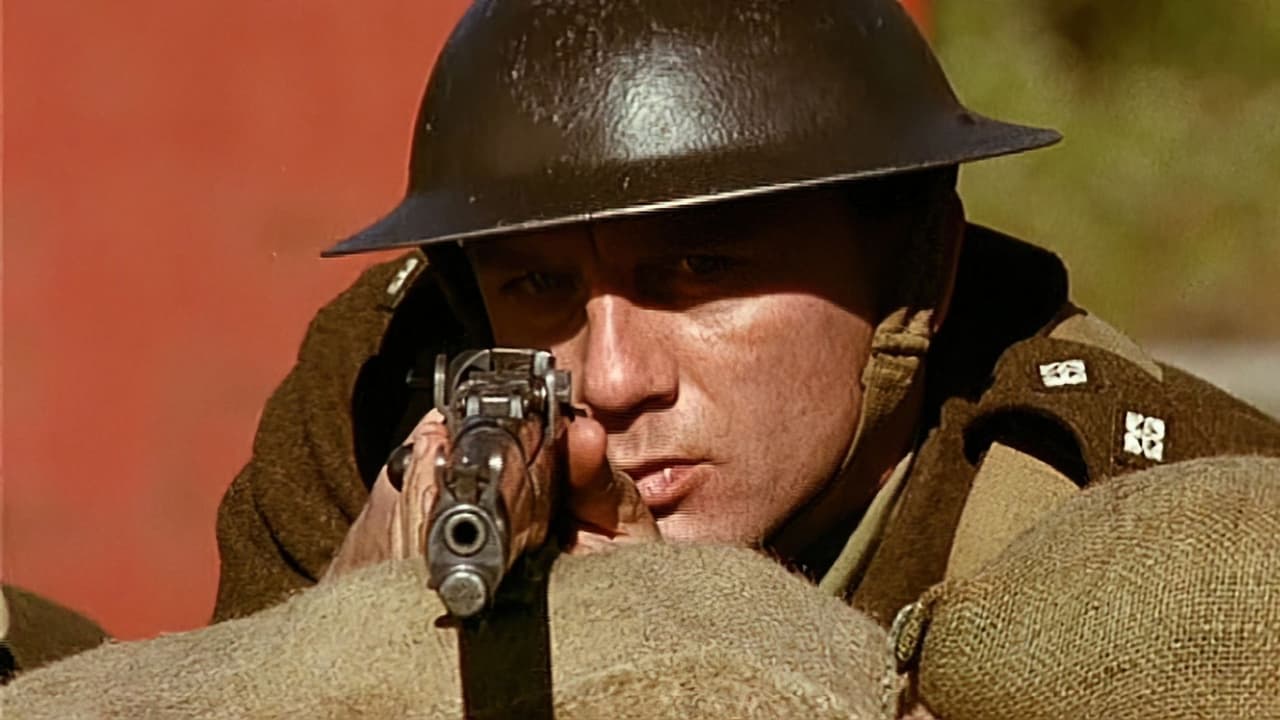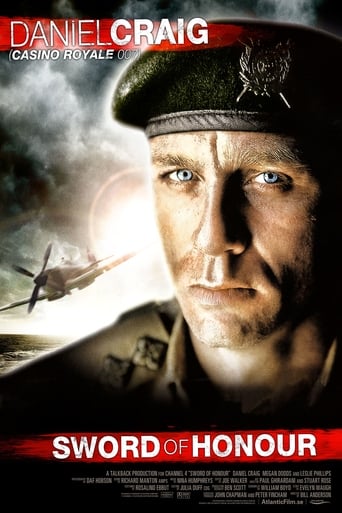

The performances transcend the film's tropes, grounding it in characters that feel more complete than this subgenre often produces.
... View MoreHow wonderful it is to see this fine actress carry a film and carry it so beautifully.
... View MoreThe movie really just wants to entertain people.
... View MoreMostly, the movie is committed to the value of a good time.
... View MoreIf one is looking for or expecting a war movie filled with action, "Sword of Honour" will not do. Likewise, if one wants a nice English war film with some romance or loved ones left back home. No! Evelyn Waugh's trilogy put to film based on some of his World War II experiences is nothing like the romantic or heroic images we so often have from movies about WW II. Nor is it a gritty account of the gripping experiences of war, death and destruction so common in more modern war films that tend to bring the gore to the fore. "Sword of Honour" is none of these things. Yet it has traces of each, along with much more. The three novels incorporated quite well into this film are "Men at Arms" (1952), "Officers and Gentlemen" (1955), and "Unconditional Surrender" (1961). Waugh wrote his books from his diverse experiences of wartime service. He had kept a diary, and many of his characters are based on or are conglomerations of people he had known in the service. A couple of themes common to most of Waugh's fiction are present here. His Catholic faith and wrestlings with class distinctions are interwoven in his many exploits. The story outline and reviews elsewhere discuss the plot. I would just point out that this is a very unusual look at the military and wartime service. Comedies have a lot of fun poking fun at the military. But when a film is not a comedy – as this one is not, the exposure of so much that is wrong or that goes haywire is truly unflattering. As such, this film is satirical without being a satire. It gives account after account of ineptitude, fraud, incompetency, irony and miscues that belie any honorable notion about the military services and wartime culture. All of this is seen as experienced by Waugh's main character, Guy Crouchback, played very well by Daniel Craig. He encounters a plethora of characters. Some are fun and entertaining – if not to Crouchback, to the novel readers and film audience, such as Brigadier Ritchie-Hook. Robert Pugh plays the seemingly fearless veteran Army officer with pugnacity equal to the character. Guy Henry plays the scornful and scary Ludovic superbly. He is a sardonic and mentally disturbed character. Richard Coyle is excellent as Trimmer McTavish. He is the perfect foil to Guy's image of what an honorable officer and gentleman should be. This is made more ironic by the ruse of Trimmer's heroism and rise to high rank and honor from the lowly civilian occupation of a hairdresser. Great satire, indeed. Other actors lend panache, pathos, humility or humor to their roles as appropriate to each character. One other aspect that sets this film apart is its unusual portrayal of the wartime love or romance component. Guy's estranged wife, Angela, is a party girl, carouser, and playmate who lives for pleasure, with no sense of responsibility or respectability. Selina Cadell plays the role superbly. The title of the film comes from a little known factual story that Waugh relates in the third novel. It describes the circumstances of the Sword of Stalingrad. King George VI ordered a special long sword to be decorated with jewels and presented from the British people to the Soviets who defended the city in the battle that turned the war against Germany on the eastern front. Prime Minister Winston Churchill presented the sword to Joseph Stalin on Nov. 29, 1943, at the Tehran Conference, in the company of President Franklin Roosevelt. The movie does not include this historical situation, but the screenplay deftly covers much of the trilogy in its 3½-hour time. Toward the end, Crouchback's faith and honor rise above all the experiences he has had. He marries his former wife a second time so that her child by McTavish won't be born out of wedlock. And, after Angela is killed in a bombing raid over London, Crouchback returns at the end of the war to embrace the innocent son he has brought into the world honorably. This is not an exciting film to watch. But it is interesting and enjoyable. It's an honest account of a different picture of wartime service, especially in Britain. It's a picture that's not at all flattering about the military or culture of the time. And, it's a fine example of a lengthy literary work being expertly put on film.
... View MoreHaving savoured Evelyn Waugh's magnificent trilogy, I approached this filmic adaptation fearlessly. The expectation of seeing Daniel Craig, a favourite actor of mine, added to the enticement. Finally, being a WW2 films buff, I believed I was in for a treat.What a letdown...It's not that this mini-series is badly made, that Craig does not act well or that the dialogue is stilted. It is just soooooooo sloooooooooooow (except for some (too few) battle scenes) that it borders on boring. The one notable exception was the depiction of the battle for Crete, which looks as if was filmed on location. It had the flavour of the real thing, conveyed through the bright photography. Also, Robert Daws as brigade major Hound was fantastic. To me (no prude) the love angle was over-emphasized, with Megan Dodds annoyingly bad. Altogether, it took up too much screen time at the expense of other, more important aspects like the War, character development or Guy's Catholic dilemmas.Also, watching Richard Coyle acting in the same mode as he did in Coupling made me realize what a limited actor he is although again, I stress that in Coupling he was the heart of the show.Some reviewers have already noted that this film does not compare well with the books it is based on. I will add that while most films indeed don't, this one was an extremely painful example of how not to make a TV series based on a book, especially a masterpiece.
... View MoreI was unaware of this film adaptation of Waugh's trilogy until today's showing on British freeview TV, and missing the first half hour, also missed the chance to record it to DVD. Drat. Until I saw it. Very pretty production by Channel 4 TV and Talkback, made some 8 years back, before Daniel Craig became a superstar.I've read and reread a lot of Waugh but believed Sword of Honour to be an inexplicably stolid, inaccessibly unreadable work, so big, so long, so dull. Brideshead was the beginning of the end, the trilogy was the end writ large.Until I found the BBC radio adaptation from 1974, over 11 hours rather than this film's 4. After a few hours I began to see the early Waugh wrapped inside the less obviously satirical wrappings, his humour and gravity. The genius, in short.They don't make them like Waugh any more, nor do they make the people; the 1974 recording was made in time to catch many authentic sounding voices from the era, and some very fine acting. A gem which I recommend to any Waugh fans.This film seems to be, probably, a rather adroit shot at a script which condenses a huge tome to a few hours, but the vowels are comprehensive school, Craig is hopelessly wrong, and there are but a few flashes of sharp observation and very little wit. But the audio version is available on the internet, and of course the pictures are better.
... View More'Sword of Honour' can be seen as an update of the Boultings' 'Pilgrim's Progress' - an anachronistic idealist fights in World War Two for reasons of chivalric honour, only to see the world overrun by liars, cheats, murderers, cowards and lunatics; where decency is pointless, even dangerous. William Boyd's restructuring of Waugh's war trilogy is a miracle of adaptation - his leavening of verbal humour with slapstick; his capturing of Waugh's elliptical tone; his creation of haunting visual patterns acting as counterpoint to the horrific satire that is the war. There is one haunting sequence amid so much disintegration, the false bomb warning during Virginia's post-natal party, that magically hints at forces beyond man's self-defeating endeavour, while also rescuing a character Waugh was rather hard on. In the moral sense.
... View More